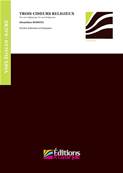
These three famous choirs were adapted in French on November 20, 1844, in Salle E. Troupenas, Paris. He was a friend of the composer. This arrangement is for 3 female voices and piano accompaniment. In Rossini’s catalog, and for references, they kept their French titles.
The first two choirs are based on two other choirs of “Œdipe à Colone” set to music by Rossini for the Italian Sophocle’s tragedy. The third choir was composed in 1844.
The first choir is differently composed than the two others; the first Italian version of “La Fede” (1858) is a little bit shorter and the piano part is simplified, but it was set that both texts — French and Italian cannot be published with the same melody, that’s why we have the two original versions of “La foi”/“La fede.” One is published with two Italian texts. The author of the first one is not surely identified, however, it is chosen by the major part of vocal ensembles. The second line of the text — be careful it is not a stanza, is the original version published by G. Brandus in 1858. The text very close to a French translation was probably written by Rossini. The version with the French text is the original version published by E. Troupenas in 1844. The three texts of “L’espérance”/“La speranza” and “La charité”/“La carità” are similar and can be overlaid easily. Rossini did not change the composition of these two choirs.
|